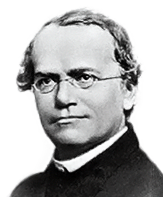

Gregor Mendel was born on July 20, 1822 in the city now known as Hyncice in the Czech Republic, but at the time part of the Austrian Empire. He joined the Augustinian Abbey of St. Thomas in 1843. Mendel was educated at the University of Vienna. He remained at the monastery all of his life, rising to the position of abbot in 1868. Mendel died on January 6, 1884.
At the monastery, Mendel conducted thousands of experiments with pea plants in order to study variation in flower color, pod color, stem length, seed type, and other properties. Based on these experiments, Mendel formulated basic laws of inheritance, including the concept of dominant and recessive traits. Mendel's work was largely ignored in his time, but was rediscovered in the early 20th century. Mendel is now considered to be the father of modern genetics.
In 1936, Ronald Fisher studied Mendel's pea plant data, and concluded that the data were too perfect and thus had probably been fudged. Nonetheless, Mendel is one of the most important scientists of the 19th century, and is of special interest to students of probability because of the crucial role of randomness in genetics.